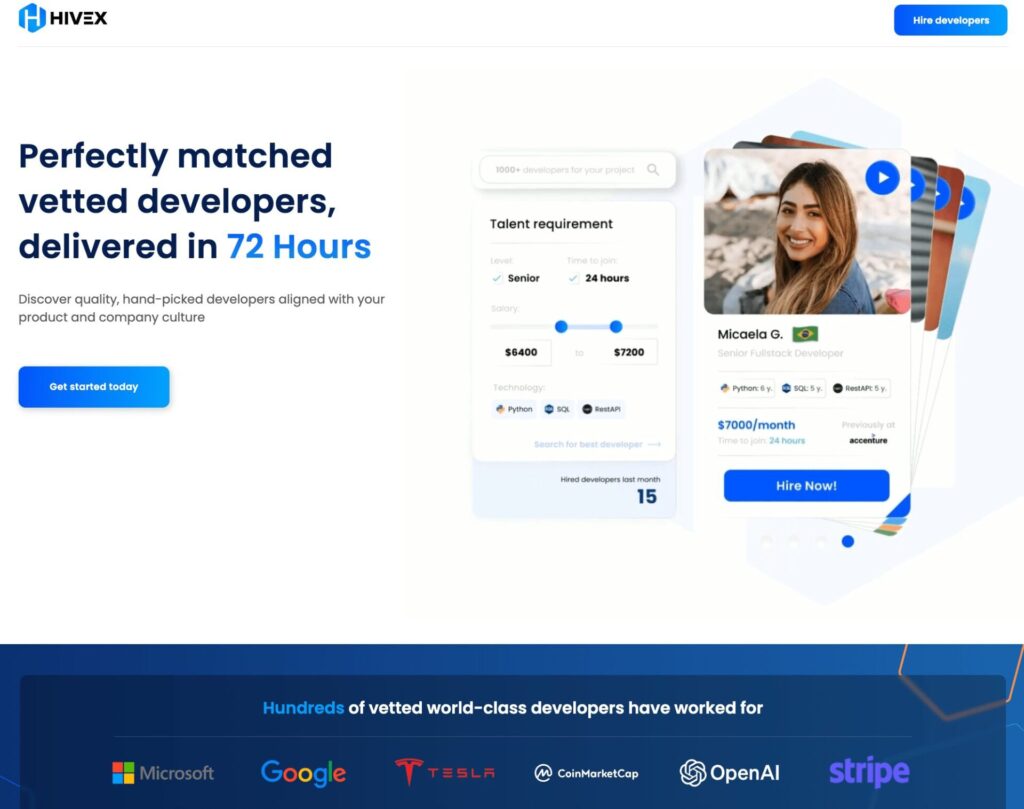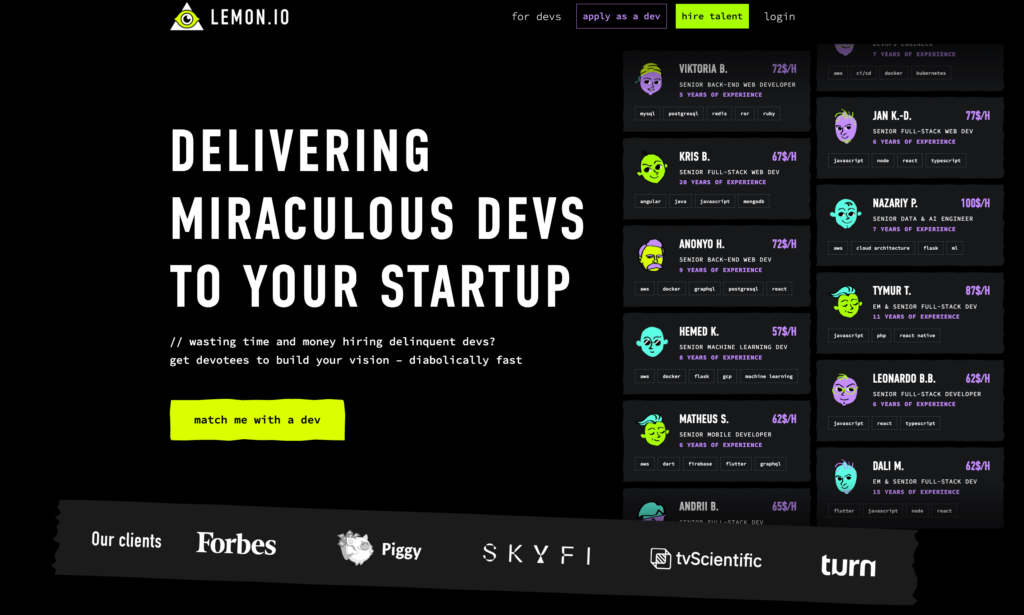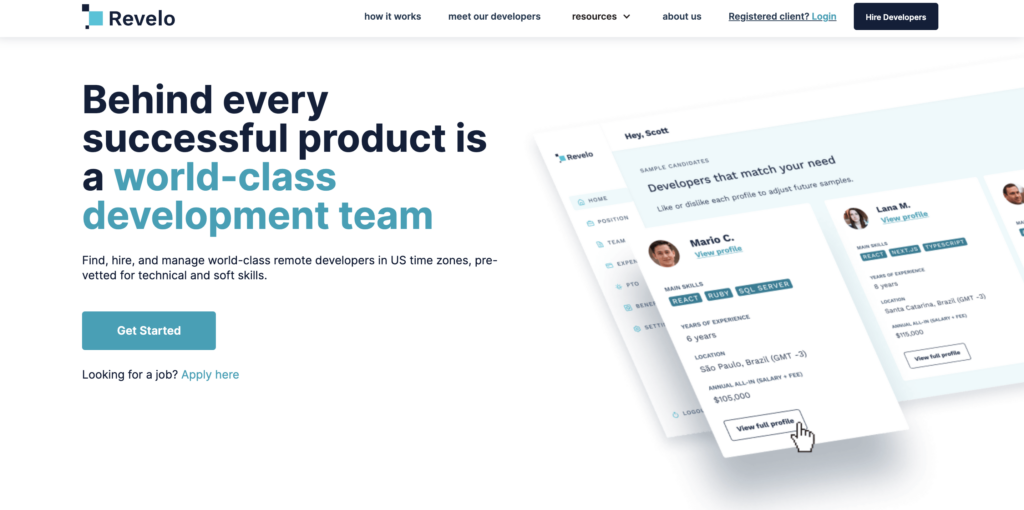Fiverr Alternatives for Hiring Skilled Developers

For businesses needing remote workers, Fiverr is often the go-to platform due to its immense popularity. However, just because Fiverr is well-known doesn’t necessarily mean it fits your specific needs best.
In this article, we’ll explore a range of Fiverr alternatives that can help you find talented remote professionals. Each platform offers unique features and caters to different business requirements.
By understanding the available options, you can make an informed decision and find the right fit for your company’s remote hiring needs.
Let’s get started!
1. Hivex

Hivex is a specialized platform for the recruitment and onboarding of pre-vetted remote developers, tailored to meet clients’ technical needs and project requirements. The platform focuses on helping companies find the right developers within 3 days.
Key Features of Hivex:
- Rigorous Selection Process: Hivex evaluates every candidate through a rigorous selection process, ensuring a perfect match for clients’ projects.
- Comprehensive Development Expertise: Hivex offers a comprehensive solution for hiring remote software developers across the spectrum, including front-end, back-end, mobile, and full-stack expertise.
- Transparent Reporting and Time-Tracking: The platform provides a transparent reporting and time-tracking system, giving clients insights into their projects and enabling informed decision-making.
- Flexible Engagement Models: Hivex offers flexible engagement models designed to meet a variety of project demands, ensuring clients have the right talent for the right job without incurring any recruitment fees.
- Comprehensive Hiring Management: Hivex manages all hiring expenses, from candidate search and assessment to payroll and HR management, at no extra cost, with clients’ only investment being the developer’s salary.
- Risk-Free Trial: Hivex offers a 30-day trial period, allowing clients to evaluate the developer’s fit within their team without taking any risks.
Hivex: Pros and Cons
Pros:
– Precision matching within 3 days
– Vetted developer pool
– Covers recruiting fees, global payroll, and HR services
– Transparent reporting and time tracking
– Risk-free guarantee and 30-day trial period
Cons:
– Mostly works with startups and SMBs
– Matching may be slower for projects with less common tech stacks
2. Upwork

If you’re looking to find skilled remote developers for your company, Upwork stands out in a sea of freelancing sites. One of Upwork’s most remarkable features is its ability to provide a comprehensive view of each developer’s expertise and past performance.
By allowing you to browse through work samples and client reviews, Upwork empowers you to make informed decisions about the talent you bring on board.
Upwork takes the guesswork out of evaluating developers by utilizing a clear and concise talent badge system. These four distinct badges offer insights into each freelancer’s work quality, delivery track record, and experience.
With this information at your fingertips, you can easily identify developers who align with your project requirements and company culture.
Key Features of Upwork:
- Access to a vast pool of talented developers with diverse skill sets and expertise
- Comprehensive work samples and client reviews for each developer
- Clear talent badge system for evaluating work quality, delivery track record, and experience
- Flexibility in selecting fixed-rate and hourly contracts
- Ability to negotiate pricing and payment terms for tailored collaboration
- Secure payment system with built-in protections for both clients and freelancers
Upwork: Pros and Cons
Pros:
– Large, diverse talent pool
– Intuitive dashboard and messaging platform
– Easy job posting process
– Quick applicant response
– Handles tax paperwork
– API for automation
– Optional weekly expenditure reports (an additional fee)
– Scalable premium plans for larger businesses
Cons:
– Lack of guidance for writing job posts
– Self-evaluation of freelancer skills required
– Paid access to many helpful features
– Communication challenges with global freelancers
– Job success scores are not entirely accurate
3. Toptal

Toptal is a freelancing platform that prides itself on providing a competitive, transparent, and equitable recruitment process for businesses seeking to hire remote developers. The company maintains a rigorous selection process, ensuring that only the most skilled and talented developers are included in its network of top-tier professionals.
With a highly skilled Toptal team and access to a vast global talent pool, clients can rest assured that their projects will be staffed with exceptional remote developers who possess the potential to enhance operations and contribute to increased profitability across various aspects of the business.
To ensure a seamless experience, Toptal maintains a specialized team committed to continuously pairing clients with the most suitable freelancers for their projects. Their meticulous matching process considers various factors, including industry expertise, skill proficiency, and availability, to ensure the right fit for each project.
Key Features of Toptal:
- The competitive and equitable recruitment process for hiring remote developers
- Rigorous selection process to maintain a network of top-tier talent
- Access to an extensive global talent pool, ensuring diversity in expertise
- A dedicated team committed to pairing clients with suitable freelancers
- Meticulous matching process that considers industry expertise, skill proficiency, and availability
- Comprehensive support, handling technical intricacies to enable clients to focus on product development
Toptal: Pros and Cons
Pros:
– Highly vetted freelancers
– English-speaking global talent pool
– Customized matching based on project requirements
– Money-back guarantee if unable to hire
– Option for remote or on-site workers
Cons:
– Paid option is more expensive than similar platforms
– Limited freelancer pool for creative industries
– Non-transparent pricing
– Not suited for quick or inexpensive projects
4. Turing

Turing is an AI-powered recruitment platform dedicated to helping businesses expand their development teams with remote software engineers. The organization operates with a workforce of over 600 remote employees who specialize in bridging the gap between companies and the best remote developers worldwide.
With access to a vast talent pool consisting of over 2 million developers hailing from 150 countries, Turing empowers businesses to confidently locate the ideal candidates to fulfill their unique business requirements.
Leveraging its extensive network and AI-powered recruitment capabilities, Turing allows clients to handpick developers from a diverse pool of over 100 skill categories, enabling the assembly of teams comprising Silicon Valley-caliber remote programmers within a remarkably short timeframe of up to four days.
Turing’s services extend beyond the initial recruitment process. Once a team of remote engineers is established, the platform implements automated management controls to ensure that the team maintains consistently high levels of productivity and efficiency throughout the project.
Key Features of Turing:
- AI-powered recruitment platform focused on building remote development teams
- The workforce of over 600 remote employees specializing in bridging the gap between companies and top-tier remote developers
- Access to a vast talent pool of over 2 million developers from 150 countries
- Ability to assemble teams of meticulously screened remote engineers across various domains, including eCommerce, healthcare, fintech, education, and more
- Access to a diverse pool of over 100 skill categories, enabling the assembly of Silicon Valley-caliber remote programmer teams
- Rapid team-building process, with the capability to assemble teams within four days
- Automated management controls to ensure consistently high productivity and efficiency within remote teams
Turing: Pros and Cons
Pros:
– Customer success teams provide ongoing support
– Quick turnaround time for addressing concerns
– Highly qualified candidates
Cons:
– Developers are based globally, potential time zone conflicts
– Lack of a common interaction platform between clients and developers beyond chat
5. Lemon.io

Lemon.io is a marketplace for vetted developers from Europe. The platform focuses on providing access to proven professionals with strong soft and hard skills, as well as experience in remote work, rather than freelancers.
Key Features of Lemon:
- European Talent Pool: The platform primarily focuses on developers from Europe, where the cost of living is generally lower compared to the US, resulting in more competitive rates.
- Quick Matching: Lemon offers a rapid matching process, typically within 48 hours, allowing businesses to quickly access the talent they need.
- Cost-Effective Hiring Solutions: With a focus on European developers and lower costs of living, Lemon provides cost-effective hiring solutions for businesses.
- Strong Specialization in Remote App Developers: The platform specializes in providing remote app developers, ensuring clients have access to professionals with the specific skills required for their projects.
- Project Estimation: Lemon offers project estimation before the start, allowing clients to provide requirements and details about their projects, and receive an estimate of the number of hours required, helping to project the total cost.
- Main Technologies: The platform works with developers skilled in various technologies, including JavaScript, Python, Ruby on Rails, Data Science, Java, and Swift.
- Full-Time Hiring Possibility: Lemon provides the option to hire developers full-time, allowing them to visit the client’s office and meet the team, with travel expenses covered by the client.
Lemon.io: Pros and Cons
Pros:
– Quality talent through a rigorous vetting process
– Flexibility in project size and duration
– Good for Python, Javascript, Ruby on Rails, Java, and Swift
– Dedicated project managers for effective communication
– Secure payment system
Cons:
– Talent pool may be limited compared to larger freelance platforms
– Premium pricing for access to quality developers
6. Freelancer.com

Freelancer is a popular online freelancing platform that connects businesses and individuals with freelancers from around the world. It offers a marketplace for a wide range of services, from web design and programming to writing and graphic design.
Key Features of Freelancer:
- Wide range of services catering to diverse skills and industries, including web development, graphic design, content writing, digital marketing, data entry, and many more.
- Project posting system that allows clients to detail their requirements and budget, enabling freelancers to bid and propose their rates and approach.
- Competitive bidding system where freelancers submit proposals for clients to review and select the most suitable candidate based on profiles, portfolios, and proposed solutions.
- Comprehensive profile and portfolio features that enable freelancers to showcase their skills, experiences, and previous work, aiding clients in making informed hiring decisions.
- Integrated communication tools for messaging and file sharing, ensuring clear and efficient communication between clients and freelancers throughout the project lifecycle.
- Secure payment system with an escrow feature that holds the payment and releases it only when the work is completed to the client’s satisfaction, providing a safeguard for both parties.
- Review and rating system that allows clients and freelancers to leave feedback for each other, fostering trust and credibility within the community.
- Contest hosting capabilities, enabling clients to launch contests for specific projects and receive submissions from multiple freelancers, with the option to select the best submission.
- Mobile app for convenient access and project management on the go, enhancing the platform’s accessibility and usability.
Freelancer.com: Pros and Cons
Pros:
– Directory of freelancers categorized by skills
– Ability to select the desired price range
– Option to find freelancers across different time zones
Cons:
-An automated bidding system makes it difficult to assess freelancer capabilities
– Complex interface and tracking challenges for monitoring freelancers’ work status
– Desktop app limitations, only managing hourly projects and excluding non-hourly projects and chats
7. Guru

Guru.com is an online freelance platform designed to connect businesses with expert freelancers across various domains, including remote developers. As a comprehensive marketplace for freelance work, it offers a range of features to facilitate successful collaborations between clients and talented professionals.
Key Features of Guru:
- Job Posting and Quotes: Employers can post job requirements for free and receive quotes from interested freelancers, allowing for a transparent and competitive bidding process.
- Flexible Payment Options: To accommodate diverse project needs, Guru offers multiple payment models, including fixed-price, hourly, task-based, and recurring options, providing flexibility for clients and freelancers alike.
- SafePay Payment Protection: Guru prioritizes security and peace of mind by implementing a SafePay payment protection system, ensuring financial transactions are secure and risk-free for both parties.
- Global Reach: With access to freelancers from various countries around the world, Guru empowers businesses to tap into a diverse pool of expertise, enabling them to find the right fit for their unique project requirements.
- 24/7 Support: Acknowledging the importance of reliable assistance, Guru provides dedicated customer support available around the clock, ensuring that clients and freelancers have access to help whenever they need it.
Guru: Pros and Cons
Pros:
– Free version available
– Verified freelancers
– Access to a global talent pool
– Built-in secure payment system
– Collaboration tools
Cons:
– Payment system lacks integration with accounting software
– No mobile app
– Manual quote evaluation process
8. Proxify

Proxify is another great platform focused on connecting businesses with remote software developers. It is designed to streamline the hiring process, offering a quick matching system and a high success rate in pairing clients with suitable developers.
Key Features of Proxify:
- Rapid Matching Process: Proxify boasts a remarkably quick matching process, typically completing client-developer pairings within 2 days.
- High Match Success Rate: The platform’s matching system is known for its efficiency, delivering a high success rate in pairing clients with remote developers aligned with their specific project needs.
- Personal Matchers: Clients are assigned personal matchers who take a hands-on approach to handpicking developers tailored to the unique requirements of each project.
- Emphasis on Quality: Proxify places significant emphasis on the quality of its vetted developers, with hourly rates starting at €31.90, reflecting the expertise and experience of the professionals available on the platform.
- Satisfaction Guarantee: The platform offers a satisfaction guarantee, ensuring that clients are not charged if they are not satisfied with the assigned developer after the first week of collaboration.
- Diverse Competencies: Proxify boasts over 500 competencies, catering to a wide range of technical skills in software development, enabling businesses to access the specific expertise required for their projects.
Proxify: Pros and Cons
Pros:
– Rapid matching within 2 days on average
– Vetted talent pool at €31.90/hr and above
– High 94% matching success rate
– Personal assistance in finding suitable developers
– Satisfaction guarantee with no charge if unsatisfied after a week
Cons:
– Focus on European developers, limited geographical diversity
– Starting hourly rate may be higher than some other platforms
9. Andela

Andela is a platform that connects companies with skilled software engineers and offers a comprehensive solution for hiring remote developers. The platform combines advanced technology with a global talent pool to streamline the hiring process and match businesses with the right professionals.
Key Features of Andela:
- Andela Talent Cloud: An AI-driven platform providing end-to-end talent management, from sourcing to hiring, ensuring a seamless and efficient process.
- Global Marketplace: Access to a diverse range of professionals from over 175 countries, offering a wide array of expertise and perspectives.
- Flexible Hiring Models: Options to hire individual talents, teams, or use fully managed services, catering to various business needs and project requirements.
- AI Matching Algorithms: Efficient matching of the right talent with specific roles and skills, leveraging advanced algorithms to ensure a high success rate.
- Transparent Talent Profiles: Complete visibility into talent profiles and skills assessments, allowing businesses to make informed hiring decisions.
- Performance-Based Assessment: Predictive performance capabilities for a high talent match success rate, ensuring businesses are paired with professionals who meet their specific needs.
Andela: Pros and Cons
Pros:
– Strict vetting process with a 0.5% acceptance rate
– Clear price brackets for junior, mid-level, and senior developers
– Quality talent pool of over 250,000 engineers, product managers, and designers
Cons:
– Shortage of senior and experienced developers
– Focus on long-term hires, not suitable for short-term projects
– Relatively expensive pricing compared to other tech hiring platforms
10. Gun.io

The Gun.io platform connects clients with technical talent, particularly software engineers. The platform focuses on providing businesses with access to high-quality professionals and facilitating efficient and flexible engagements.
Key Features of Gun.io:
- AI-Driven Matching: The platform utilizes advanced algorithms to facilitate efficient talent matching, increasing the likelihood of successful partnerships between clients and developers.
- Flexible Engagements: The platform provides flexibility in scaling up or down based on business needs, with options for varying work hours, enabling businesses to adapt their workforce to changing project requirements.
- Quick Matching: Clients can meet potential developers within 24 hours and potentially hire them in less than two weeks, allowing for a rapid and efficient hiring process.
- Dedicated Support: Gun.io offers continuous support throughout the hiring process and the engagement period, ensuring clients receive guidance and assistance at every step of their journey.
Gun.io: Pros and Cons
Pros:
– Vets freelancers for seriousness and competency
– Only accepts experienced freelancers
– Refund guarantee or contractor switching if needed
– Wide variety of tech roles available
– Refund guarantee
Cons:
– No set pricing, quote-based system
– Often expensive, depending on the project
11. Remotebase

Remotebase is a platform dedicated to providing businesses with highly skilled remote software engineers who excel at delivering exceptional results and ensuring the successful and timely completion of projects.
Key Features of Remotebase:
- Regular Performance Evaluations: The platform maintains a robust system of regular performance evaluations, meticulously conducted to ensure the quality of work remains consistently high throughout every phase of development.
- Seamless Project Execution: By providing access to skilled remote engineers and conducting regular evaluations, Remotebase enables businesses to trust in the quality of their team’s output and enjoy the benefits of seamless project execution.
- Rigorous Vetting Process: Remotebase prides itself on its rigorous and comprehensive vetting process, ensuring that only the most qualified developers are included in its network.
- Continuous Training and Development: All distributed teams undergo regular and intensive training sessions to uphold the highest standards of professionalism.
- Free Trial: The company offers a 2-week free trial period, allowing businesses to experience their team’s true potential without financial commitment.
Remotebase: Pros and Cons
Pros:
– Assemble remote teams within 24 hours
-Large and growing talent pool for any tech stack and domain
– Short-term, long-term, or project-based engagements
-Competitive and transparent pricing, up to 60% savings
-Free trial and money-back guarantee
Cons:
– There is a potential time zone difference between companies and talent Remotebase hires from around the world.
– Remotebase recruits talent from diverse backgrounds and cultures, so there may be some differences in work styles, expectations, and preferences.
– Remotebase hires talent remotely, which means companies have to trust them with their data. Particularly for confidential or regulated projects, this can pose some privacy and security risks.
You may also like: Software Development Security Standards: A Complete Guide
12. Revelo

Revelo is a platform that helps companies find, hire, and manage world-class remote developers from Latin America.
Key Features of Revelo:
- Pre-Vetted Talent: Revelo focuses on sourcing candidates who have undergone a rigorous vetting process
- Rapid Matching: The platform promises shortlists within 3 days and the potential for hiring within 2 weeks
- Flexible Roles: Revelo caters to various roles, including senior developers, architects, tech leads, and directors, providing businesses with the flexibility to build teams tailored to their specific project requirements.
- US Time Zone Synchronization: Revelo offers developers working synchronously in US time zones, ensuring seamless collaboration and communication between clients and remote teams.
- Support and Compliance: The platform provides comprehensive support throughout the engagement and handles complexities such as payroll, benefits, taxes, and local compliance, enabling businesses to focus on their core objectives.
- Risk-Free Trial: Revelo offers a trial period at no charge if clients are not satisfied within the first 14 days.
Revelo: Pros and Cons
Pros:
– Affordable hourly rates between $50-$70
– 2-week risk-free free trial to try developers
– Pre-vetted candidates for quality assurance
– Over 100 tech stacks and languages available
Cons:
– Non-refundable $500 upfront fee
– Less than 50% of developers have mid to senior-level experience
– Talent pool limited to Latin American countries
Conclusion
As we’ve explored various platforms, it’s clear that each offers unique advantages for hiring remote developers. From rigorous vetting processes and diverse talent pools to flexible engagement models and rapid matching, these platforms cater to a range of business needs.
When selecting the right platform for your company, consider factors like the specific skills required, budget constraints, project timelines, and preferred management style.
Whether you’re looking for top-tier talent, budget-friendly options, or rapid team assembly, there’s a platform tailored to meet your requirements.
Ultimately, the choice depends on your business’s unique needs and goals. By leveraging the strengths of these platforms, you can build a strong, efficient remote team that drives your projects to success.
Read also: Software Developer Onboarding Checklist: The Ultimate Guide


